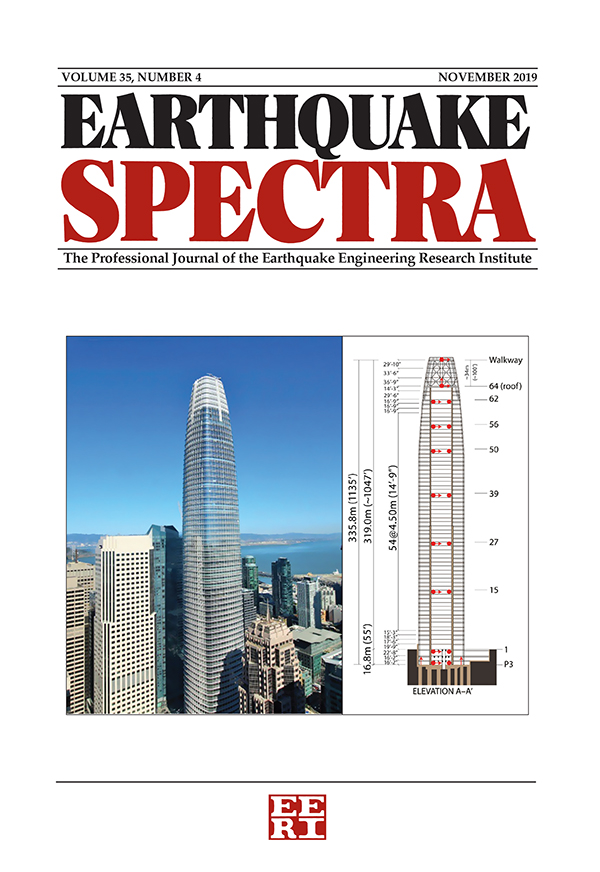Recorded and modeled response of the Thorndon Overbridge during multiple earthquakes
IF 3.7
2区 工程技术
Q2 ENGINEERING, CIVIL
引用次数: 0
Abstract
This article presents the recorded and modeled strong-motion response of a long (1.35 km) bridge located in Wellington, New Zealand during multiple sequential earthquakes. These were some of the first recordings of this kind for a New Zealand highway bridge and add to the limited database of bridge superstructure strong-motion responses recorded worldwide. The bridge experienced little damage during the earthquakes; however, analysis of the recorded responses showed the fundamental period of the bridge varied by up to 15% across these events, highlighting the system softening that can develop without any significant structural damage. Numerical models of a single bridge pier using a p-y spring foundation modeling approach were able to represent the changes in the recorded bridge pier response across the events based on multiple response metrics, suggesting that system softening was primarily due to nonlinear soil response and concrete cracking. A sensitivity analysis showed that concrete strength and the characteristics of the upper soil layers had the largest influence on the model response. Given the presence of several strong-motion stations in close vicinity to the bridge, the sensitivity to ground-motion input was also investigated. This was shown to have a more significant influence on the modeled response than the other modeling uncertainties evaluated here, with the variability in estimated deformations highlighting the difficulties involved in the back analysis of the response of structures.记录和模拟桑顿桥在多次地震中的反应
本文介绍了位于新西兰惠灵顿的一座长桥(1.35公里)在多次连续地震期间的记录和模拟强震反应。这是新西兰高速公路桥梁的第一次记录,并将其添加到全球有限的桥梁上层建筑强震反应记录数据库中。这座桥在地震中几乎没有受到损坏;然而,对记录响应的分析显示,在这些事件中,桥梁的基本周期变化高达15%,突出表明系统软化可以在没有任何重大结构损坏的情况下发展。使用p-y弹簧基础建模方法的单个桥墩数值模型能够表示基于多个响应指标的记录桥墩响应的变化,表明系统软化主要是由于非线性土壤响应和混凝土开裂。敏感性分析表明,混凝土强度和上部土层特性对模型响应的影响最大。考虑到在大桥附近有几个强震台站,还研究了对地震动输入的敏感性。结果表明,这比本文评估的其他建模不确定性对模拟响应的影响更为显著,估计变形的可变性突出了结构响应反分析所涉及的困难。
本文章由计算机程序翻译,如有差异,请以英文原文为准。
求助全文
约1分钟内获得全文
求助全文
来源期刊

Earthquake Spectra
工程技术-工程:地质
CiteScore
8.40
自引率
12.00%
发文量
88
审稿时长
6-12 weeks
期刊介绍:
Earthquake Spectra, the professional peer-reviewed journal of the Earthquake Engineering Research Institute (EERI), serves as the publication of record for the development of earthquake engineering practice, earthquake codes and regulations, earthquake public policy, and earthquake investigation reports. The journal is published quarterly in both printed and online editions in February, May, August, and November, with additional special edition issues.
EERI established Earthquake Spectra with the purpose of improving the practice of earthquake hazards mitigation, preparedness, and recovery — serving the informational needs of the diverse professionals engaged in earthquake risk reduction: civil, geotechnical, mechanical, and structural engineers; geologists, seismologists, and other earth scientists; architects and city planners; public officials; social scientists; and researchers.
 求助内容:
求助内容: 应助结果提醒方式:
应助结果提醒方式:


